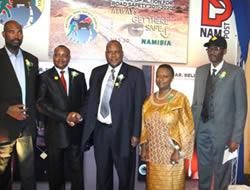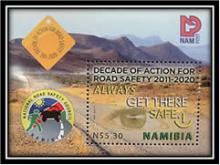Namibia Joins Global Community and Launches Global Decade of Action for Road Safety
Windhoek -- On 11 May, Namibia along with more than 150 countries worldwide launched the Global Decade of Action for Road Safety by initiating the Namibian Chapter of the Decade of Action 2011-2020, developed by the National Road Safety Council (NRSC) in collaboration the World Health Organization (WHO), the Motor Vehicle Accident (MVA) Fund among other stakeholders. To symbolize the launch, a special commemorative postage stamp produced in collaboration with NamPost was unveiled.
The Decade of Action for Road Safety 2011-2020, officially proclaimed by the United Nations General Assembly in March 2010 calls on Member States to adopt a Global Plan of Action to save millions of lives. The Decade seeks to prevent road traffic deaths and injuries which claim the lives of 1.3 million people annually. By 2020, this number will increase to 1.9 million people annually. In Namibia, approximately 12,000 accidents are recorded with an average of 500 fatalities annually.
His Excellency, the President of the Republic of Namibia, Mr Hifikepunye Pohamba, read by the Minister of Works and Transport, Honourable Minister, Mr Erkki Nghimtina during his keynote address stressed, ”As citizens of this great country, we have the shared responsibility of making our roads safe. Although the responsibility of road safety is often delegated to Government, Namibia’s Chapter of the Decade of Action calls for a multi-sectoral approach and a wider partnership involving key role players to initiate appropriate and feasible responses to the problem. The Decade of Action is everybody’s decade.”
The Global Plan for the Decade of Action for Road Safety 2011-2020 provides an overall framework for activities for countries adopt in the context of the Decade. The five categories or "pillars" of the Action Plan are: building road safety management capacity; improving the safety of road infrastructure and broader transport networks; further developing the safety of vehicles; enhancing the behaviour of road users; and improving post-crash care. Indicators have been developed to measure progress in each of these areas to keep stakeholders on track.
Honourable Minister of Works and Transport, Mr Erkki Nghimtina commented on the key pillars of Namibia’s strategy saying, “As part of the Namibian approach to the Decade of Action, an action plan or project map has been designed by the National Road Safety Council, in collaboration with WHO, the MVA , the Ministry of Safety and Security, among other stakeholders. The key components of Namibia’s strategy focus on “Education” and “Enforcement”. The purpose of education is to change mindsets, attitudes and behaviours and to create a deep-rooted culture of road safety among all road users. Another strong pillar of Namibia’s strategy relates to enforcing compliance to legislation, regulations and standards to ensure behaviour change and prevent road traffic crashes and deaths.”
The United Nations adopted a resolution which recognized the need for the United Nations system to support efforts to address the global road safety crisis. WHO Representative to Namibia Dr Magda Robalo explains, “WHO is mandated with a coordination function on road safety issues within the UN system and WHO’s role will be to facilitate the implementation of the Decade of Action to catalyse action. Therefore, the Global Plan of Action is a unique approach to road safety by recognizing that road traffic accidents is indeed a major public health issue. Through targeted interventions we can prevent the needless loss and suffering caused. These include the enforcement of legislation to control speed, drinking and driving, mandating the use of seatbelts and crash helmets, and the safer design and use of roads and vehicles. Reduction in road traffic injuries can contribute to the attainment of the Millennium Development Goals (MDGs) that aim to halve extreme poverty and significantly reduce child mortality.”
The Namibian Chapter on the Decade of Action for Road Safety is a multi-sectoral response that is estimated to cost N$747 million over the decade. On average, N$75 million is required annually for its implementation. NRSC, Executive Secretary, Mr Eugene Tendekule noted, “A comprehensive strategy such as the one developed in Namibia will require additional resources. Some of the funds required, will be mobilized through coordinated budgeting across ministries to address the various pillars of this strategy. Additional resources will be mobilized for instance through public private partnerships, insurance levies and international donors such as World Bank: Global Road Safety Facility, Ultimately, we cannot put a price tag on saving lives.”
Emphasizing further, the Chief Executive Officer, of the MVA , Mr Jerry Muadinhohamba says, “The MVA will work with stakeholders ensuring that public education programmes are implemented and sustained as well as improving emergency response and rehabilitation services along with the Ministry of Health and Social Services (MoHSS). Additionally, a core component of this plan is to put in place a comprehensive and streamlined data management system to monitor road traffic accidents and to assess our progress.”
Key stakeholders across line Ministries, the WHO, parastatals, NGO’s, donors and other stakeholders will meet in June 2011 to iron out further details of the strategy to ensure that Namibia’s Chapter of the Decade of Action is representative and inclusive of all stakeholders perspectives. “The Decade of Action’s goal is to stabilize and then reduce the forecasted level of road traffic fatalities around the world. If this ambitious target is achieved, a cumulative total of 5 million lives, 50 million serious injuries and US$5 trillion could be saved over the Decade,” stressed Dr Robalo.
For further information, please contact:
Issued by: World Health Organization (WHO) & the National Road Safety Council (NSRC) & Motor Vehicle Accident (MVA) Fund
WHO Namibia: Communications & Advocacy Officer: Michelle Thulkanam - email: thulkanamm [at] na.afro.who.int (thulkanamm[at]na[dot]afro[dot]who[dot]int) , Ph- +26461-255-191 / Cell: +264-81-423-0556.
NSRC: Chief Liaison Officer: Ambrosius Tierspoor - email: ambrosius [at] nrsc.org.na (ambrosius[at]nrsc[dot]org[dot]na) ; Ph- 264 61 231717 / Cell: +264 81-127-3161.
MVA Fund: Manager: Public Education & Communications, Ruben Uupindi – email: ruben [at] mvafund.com.na (ruben[at]mvafund[dot]com[dot]na ) ; Ph- +264 61-289 7060 / Cell: +264 811240335




